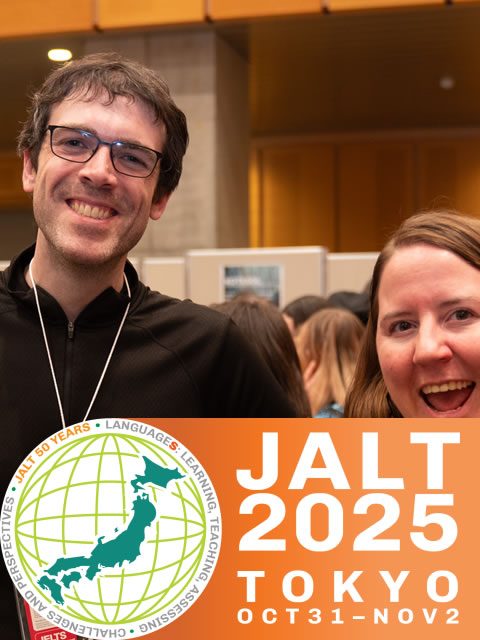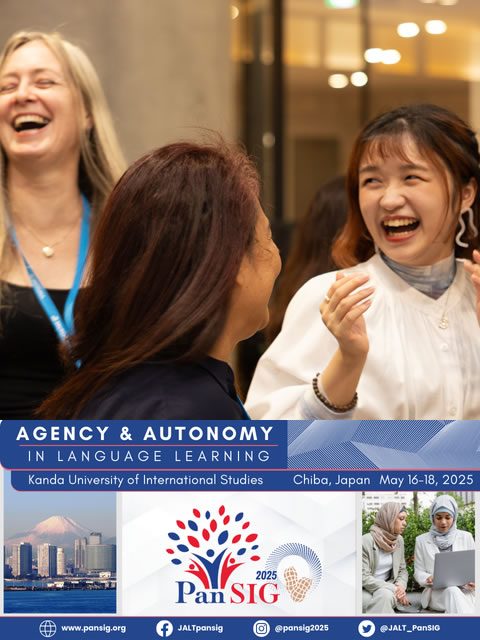Your cart is currently empty!
Graduate Student Showcase 2018
•
The Graduate Student Showcase (GSS) has been a part of the annual JALT International Conference since 2006 so 2018 marks its lucky 13th year. The Graduate Student Research Forum held annually at TESOL Conventions in the US was the inspiration for this innovative program, which provides opportunities for graduate students (masters and doctoral level) to present their research at a professional venue. This year more than 50 presenters from 13 institutions will join the JALT International Conference in Shizuoka.
Saturday, November 24, 2018
Saturday 11:40-12:40 Room 1002, Gakushuin University
Yuri NakamuraMotivation and Positive Emotion towards English learning.
This study examines the relationship between positive emotion and three motivation constructs: integrative and instrumental motivation, self-determination theory and L2 motivational self system towards English learning of Japanese university students. It also clarifies other emotions that might affect English learning.
Chika OgiharaDoes EMI promote learners’ criticality, creativity, and open-mindedness?
Japanese higher education has seen a rapid increase in English-Medium Instruction. The impact on the educational experience of students, however, is still relatively under-researched. This study investigates the students’ perspective on development of creativity, criticality and open-mindedness.
Kazuya NakanishiInvestigating the motivation effects of Dictogloss
Previous studies have shown the effectiveness of Dictogloss as form-focused instruction. Through video observation, questionnaire and interview, this study explores the relationship between learners’ noticing of form in Dictogloss activity and gains in motivation to learn English grammar.
Saturday 12:50-14:20 Room 1002, Temple University Japan
Heather WoodwardMaterial Development for Peace Boat Participants
For this presentation, I share course materials designed for Peace Boat participants based on the three principles of the Global English/Espanol Training Program: Task-Based Language Teaching, Learner-Centering, and Learn-Use-Learn-Use Cycles. Their theoretical and research-based underpinnings will also be discussed.
Eric Shepard MartinDistinguishing Difficulties Due to Prosodic Features in Repeated L2 Listening
The plan presented here is for a study which will investigate the English prosodic features that cause listening comprehension difficulties for Japanese EFL learners, and which ones are overcome in repeated listenings.
Alex TkachevLesson Framework Focused on the Acquisition of New Material
The presented framework promotes activity sequencing and personalization with attention to the four language skills (listening, speaking, reading, and writing). The presentation includes practical information and examples for lesson framework design and aims to help language teachers with lesson planning.
Allie PattersonStamp Rally: Motivating Young Learners to Engage in Self-Study
In this longitudinal action research study, I incentivized self-study through the implementation of a stamp rally, a popular pastime in Japan. This approach can be implemented in any L2 classroom and is practical for increasing motivation to engage in self-study.
Haruka UbukataDeveloping Opinion Writing Skills Through the Use of Scaffolding
The presenter addresses Japanese EFL learners’ problems organizing and expressing their ideas in writing. Sample materials that scaffold students in building skills for opinion writing and that are themed around technology that could exist in near future are presented.
Saturday 15:40-17:10 Room 1002, Soka University
Yeong Yeap WeiTeachers’ Attitudes and Usage of Technology in Vocabulary Teaching
While the effectiveness of technology in vocabulary instruction has been widely investigated, the attitudes of teachers towards technology implementation have often been overlooked. This study examines the factors that affect teachers’ attitudes and their use of technology during vocabulary teaching.
Nobushiro TanakaDeveloping a Content and Language Integrated Course for University Athletes
This curriculum project is designed for university student-athletes. To enhance those students’ motivation and interests toward English learning, this course is organized around baseball related content, and Content and Language Integrated Learning (CLIL) is employed to teach both content and language.
May NakatsukaCross-Age Reading Buddies: Literacy Development in EFL Primary Education
This curriculum project presents complementary materials and activities for the current Japanese primary English curriculum. The materials focus on learners’ literacy development, the incorporation of “reading buddies,” and are based on the integration of a needs assessment and existing literature.
Ngoh Fei JhueA Case Study: ESL curriculum at Henry Gurney School, Malacca
The primary focus of this study will be an examination of the ESL curriculum Henry Gurney School, Malacca, Malaysia, for incarcerated juvenile offenders, with an emphasis on assisting students in preparing for the Lower Secondary Examination (PT3).
Nausheen Ayesha KahnDevelopment of an ESP Curriculum for Immigrant Children in India
This curriculum project will provide an accessible and affordable educational program for refugee children in India. The program will focus on skills and knowledge necessary for tour guides, and will develop a positive attitude towards language education and career possibilities.
Saturday 17:20-19:25 Room 1002, University of Birmingham
Christopher PirottoLearners’ beliefs about language learning: A factorial investigation
This presentation will present the results of a survey which investigated the language learning beliefs of 206 university-aged language learners. Factor analysis identified six commonly held beliefs. How the researcher used this knowledge in the classroom will be discussed.
Barry GrossmanDoing Cognitive Corpus Linguistics
A unique method of metaphor retrieval and analysis within the reflexive construction has proved useful in quantitative and qualitative terms. The results of this research suggest a reevaluation of the importance of metaphoric construal within the reflexive construction.
Tracy Ann TsuruokaThe Role of the L2 in the L2 Classroom
Teaching in Japan we are often told quite strongly not to use Japanese in the classroom. In this presentation I would like to suggest that L1 use should not be totally demonized but accepted under certain conditions.
Christine PembertonAnalysis and Evaluation of Three ESL Coursebooks
Three units, one from each of three different ESL coursebooks, are examined using Littlejohn’s three-level framework. The teaching points, methodologies, syllabus, and intended learner/teaching situation are identified. Strengths and weaknesses, achievement of aims, and fit to learning situation are evaluated.
Barry CondonUsing avatars to overcome shyness and foster creativity
Many students struggle to express themselves adequately while making traditional presentations due to lack of confidence or the limitations of the format itself. This presentation will detail several alternatives, each making use of avatars, which may ameliorate these problems.
Christopher Paul ArnottHow can study abroad programs be made more effective?
Some Japanese secondary school programs are fortunate enough to send students abroad. These are generally too short to impact students’ language skills. Teachers need to help students by including tasks before, during and after travel for motivation and skill development.
Martin TeshomeLexical choices in temporally distant translations: a case study
This presentation offers an analysis of two translations of After a Race, a short story by James Joyce, into Japanese, from 1953 and 2009. It focuses on how translation norms for lexical choices may have changed over time.
Austin GardinerUsing Item Response Theory to Correlate Eiken and In-House Exams
The Birmingham module on language testing helped the researcher to correlate Eiken scores with results from tests and exams done in class. Participants were given tests made from online Eiken materials to see how well their ability in class predicts their ability in a Grade-3 level Eiken test.
Sunday, November 25, 2018
Sunday 11:35-12:05 Room 1002, Ritsumeikan University
Yuka MasutaniCommunication Strategies in Info-Gap Tasks by NNSs
Information-Gap Activities are a Staple in Communicative Language Teaching. This study analyzes the use of communicative strategies by Japanese and Chinese EFL learners during such activities. Participants’ usage of strategies was influenced by their proficiency level and partner’s cooperativeness.
Saeki KentaJapanese learners’ preferences towards native and non-native English speech.
Since English is a lingua franca, intelligibility is essential for interaction. Japanese ELF learners’ preferences towards recorded speeches of native and non-native English speakers were investigated. Native and Japanese-accented English ranked highest. Greater awareness of other varieties is required.
Sunday 12:15-13:30 Room 1002, Kobe City University of Foreign Studies
Takako YamaneIssues of Teaching English in Senior High School in Japan
This research project will explore the struggles that teachers face when bridging the gaps between new MEXT goals, the mandatory textbooks and the need to prepare students for university entrance exams while using an active learning style of teaching.
Keiko Haruoka
Critical Analysis of MEXT Authorised Textbooks for Japanese High Schools
MEXT’s revised the Course of Study for English and “Speaking” will be evaluated from two aspects: Interaction and Production from 2022. This research aims to reveal how much current textbooks fulfil the goals of the new Course of Study.
Emi ShibuyaSenior L2 Language Learning for Specific Purposes: Experience and Motivation
This research focuses on second language learning for seniors as lifelong learning and involvement in society. How to maximize senior’s life experience, knowledge and motivation through a training-course on tour guiding in a foreign language will be shown.
Hitoshi OgoshiHow Hiragana Affects and Supports Low English Proficiency Learners
It is difficult for low proficiency learners to write or pronounce English accurately. The presentation will explain how Hiragana as phonetic symbols affects and supports learning through vocabulary notebooks.
Kazuhiro ShiomiA Case Study of Co-Teaching
This is a case study of an inexperienced Japanese co-teacher of English’s (JTE) skill development supported by a facilitator. The JTE is a specialized English teacher at an elementary school co-teaching with an Assistant Language Teacher (ALT) and homeroom teachers.
Sunday 13:40-15:15 Room 1002, Kanda University of International Studies
Ewen MacDonaldPractical ways of raising Japanese EFL learners’ pragmatic awareness
A common issue in the Japanese EFL context is students’ lack of pragmatic competence. The presenter will discuss the causes of this, and will suggest various pedagogical actions that can be undertaken by teachers to raise their learners’ pragmatic awareness.
Aya HagiwaraHaving a Strong Learning Community Helps Learners Succeed
Learning community is a vital component in successful learning that helps facilitate the learning process and build motivation among the learners. I will discuss how the community has been created in class, and examine the students’ psychological effects in learning.
Christopher MaschioLessons Learned: Reflections of a New University Teacher
This presentation reports on the journey of a teacher’s first six months of teaching EFL to first-year students at a Japanese university. The presenter will explore the challenges encountered while teaching large classes and reflect on how they were overcome.
Kyoko GruendelWhat kind of homework helps students learn most and reason?
Teachers have to analyze our approaches in providing students with appropriate homework to promote their learning autonomously. Hence, I conducted a small research to understand what kind of homework helps my students learn the most and find out the reason.
Sunday 16:45-17:30 Room 1002, Tsuda University
Tomomi KodamaApplying Extensive Reading to University EFL Classes
Extensive reading is said to have positive effects on the development of various aspects of English proficiency. This presentation discusses the use of extensive reading in two EFL classes at a university and its effects.
Nobuko ShimoyamaCollaborative Writing
This research addresses the following question: Does collaborative process writing improve students’ writing and their motivation? The participants are 41 high school students. The process consists of four writing stages, repeated four times. The students’ compositions and questionnaires are analyzed.
Keiko ToyotaUsing Tasks in Junior High School in EFL Classes
The purpose of this presentation is to examine the effectiveness of using tasks in public junior high school EFL classes. Whether the inclusion of tasks improved the students’ speaking skills and raised their motivation is discussed.
Sunday 17:45-19:20 Room 403, Macquarie University
Nishioka HiromiEngaging in language learning in collaborative digital storytelling projects
The focus of this study was to investigate language learning undertaken by 14 learners of Japanese during collaborative digital storytelling projects; one form of project-based learning. This study analysed how the participants engaged in language learning during their projects.
Leigh McDowellDevelopment of a specialised corpus for Error Analysis
This presentation presents an account of corpus building for application in ESP research and pedagogy. It includes initial analyses from the corpus, and highlights how corpus tools can be integrated with an elaborated error analysis framework to identify problematic language patterns in research writing.
Min Jung KimFeedback on L2 writers’ use of grammatical metaphor
The present study investigates the role of a teacher’s feedback in the use of grammatical metaphor, exploring both corrective and supportive feedback as a supportive tool to enhance the use of grammatical metaphor of L2 learners in their written texts.
Chie KawashimaAnalysis of speech acts presented in ELT textbooks
This study looks at presentation of speech acts in ELT textbooks for low-level learners. The analysis reveals peculiarity of presenting language use in these textbooks. Finally how to compensate the paucity of pragmatic information in materials is discussed.
Anh Ton NuPragmatic input in Vietnamese EFL textbooks
This study was conducted to see how pragmatics is incorporated into Vietnamese EFL textbooks. The results show that there is a paucity of explicit information on pragmatics in these textbooks, and that the pragmatic information presentations were theoretically inadequate.
Lyndell NagashimaJapanese discourse on study abroad: National intercultural competencies
Preliminary findings will be presented on Japanese discourse within study abroad governmental promotional and descriptive material. This is to identify Japanese nationalism, and possible restriction of its citizens’ intercultural and communicative competence outside the country’s borders.

JALT2025 International Conference
2025年10月31日(金)〜2025年11月02日(日) 東京都渋谷 国立オリンピック記念青少年総合センター Friday, October 31 – Sunday, November 02, 2025 • National Olympics Youth Memorial Center, Tokyo, Japan

PanSIG Conference
PanSIG 2025 will be held May 16-18 in Chiba. PanSIG is an annual conference organized by JALT’s Special Interest Groups (SIGs).
